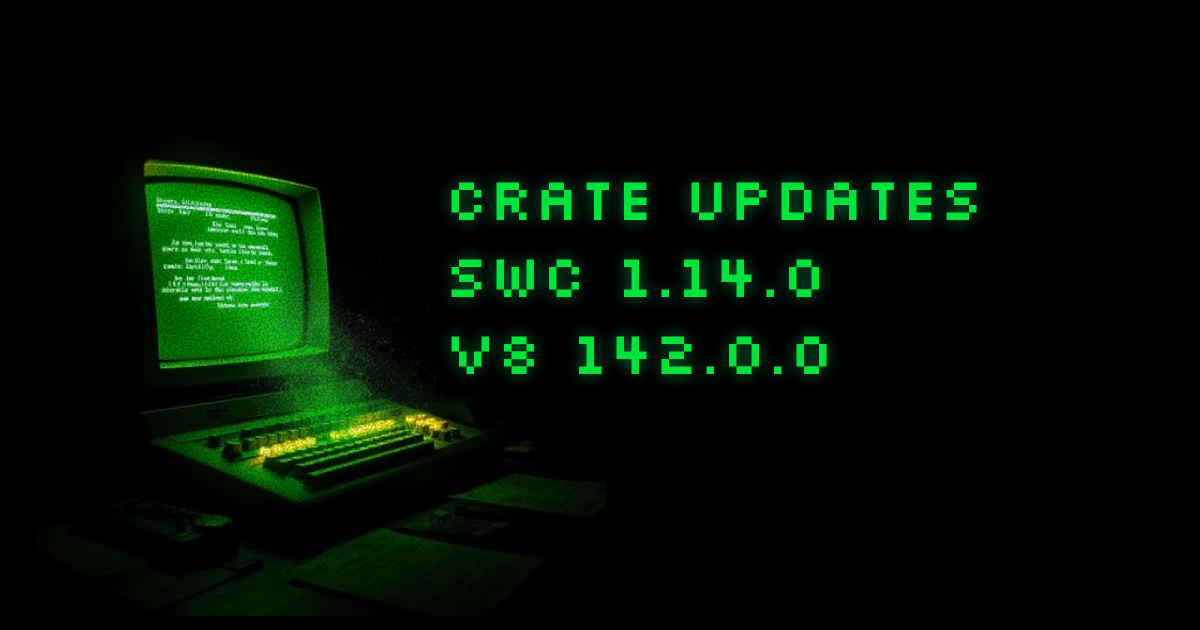This week's updates highlight a strong focus on Rust-powered web tooling and performance. The Speedy Web Compiler (SWC) rolled out a key minifier optimization that directly reduces bundle sizes by merging imports.
Beyond the frontend, foundational libraries for runtimes, cryptography, and collections also received crucial updates. These improvements demonstrate a continued drive towards greater stability, security, and modern feature support across the ecosystem.
In this weeks’s Rust Crates recap:
> SWC's new import-merging optimization
> rusty_v8's update to the latest V8 engine
> rustls expands crypto support with Ed448
> hashlink ships a critical soundness fix
SWC Supercharges Minifier
The Recap: The Speedy Web Compiler (SWC) project rolled out a series of updates, highlighted by a new import-merging optimization in its minifier to shrink bundle sizes and key API stability improvements for Rust developers.
Unpacked:
A new
merge_importsoptimization pass in the minifier combines multiple import statements from the same source, reducing final bundle sizes for more efficient web applications.Core AST enums are now marked as
non_exhaustive, a crucial update that improves API stability for Rust users by preventing breaking changes when new variants are added.The new
Wtf8Atomtype was introduced for more efficient string handling, underpinning SWC’s performance improvements. You can learn more about Atoms in the official documentation.A new AST Viewer was introduced in the bindings, offering developers better tools for debugging and understanding code transformations.
Binary loading and validation for ARM64 and Alpine Linux (musl) environments have been improved, ensuring wider compatibility and easier deployment.
Bottom line: This update delivers tangible benefits for both JavaScript and Rust developers in the SWC ecosystem. The new optimizations make it even better for creating lean web bundles, while API enhancements provide a more stable foundation for building custom tooling.
V8 Engine Jumps Forward
The Recap: The rusty_v8 crate, which provides essential Rust bindings for Google's V8 engine, has been updated to version 142.0.0. This release synchronizes the project with the latest V8 from a new Chrome version, bringing the newest JavaScript and WebAssembly features to the Rust ecosystem.
Unpacked:
The version number 142.0.0 directly reflects alignment with Chrome's major version, ensuring you have access to a V8 engine that is modern and stable.
As a core dependency of the Deno runtime, this update is crucial for keeping the popular server-side JavaScript platform current with V8's latest features and security patches.
The project's versioning strategy promises a new major release every four weeks, mirroring Chrome's cycle and giving developers a predictable upgrade path.
You can use pre-built binaries for a fast setup or compile from source using the
V8_FROM_SOURCEflag for more control over the build. Check the documentation for details.
Bottom line: This update ensures the Rust ecosystem keeps pace with the rapid evolution of the web's most prominent JavaScript engine. For developers building anything from JS runtimes to high-performance serverless platforms, this alignment provides a reliable and feature-rich foundation.
Rustls Expands Crypto Support
The Recap: The rustls-pki-types crate, a foundational part of the Rustls ecosystem, has released version 1.13.0, introducing support for the Ed448 signature algorithm and shipping numerous API and performance improvements. You can review the full changelog to see all the updates.
Unpacked:
The crate now includes Ed448 support, adding a modern and highly secure signature algorithm to the Rustls ecosystem for more robust public key infrastructure. You can explore the implementation details in the original pull request.
A variety of types now implement the
Hashtrait, a significant ergonomic win that allows you to use them directly in collections likeHashMapandHashSet.The update brings performance improvements by marking more functions as
constfor compile-time evaluation and by reducing memory allocations during PEM parsing.New
Fromimplementations forServerNameandIpv4Addrenhance API ergonomics, making type conversions more seamless and reducing boilerplate code.
Bottom line: This release significantly expands the cryptographic versatility of the rustls ecosystem, giving developers access to a next-generation signature algorithm. The accompanying focus on performance and API ergonomics makes the library faster and more intuitive to integrate into security-critical applications.
Hashlink Gets Soundness Fix
The Recap: The hashlink crate, a high-performance alternative to the standard library's collections, has released version 0.11.0. The update ships a critical soundness fix, upgrades its core dependency, and welcomes a new maintainer.
Unpacked:
The release resolves an unsound
Sendimplementation, fixing a potential data race when usinghashlink's data structures across multiple threads.The crate has been upgraded to hashbrown v0.16, ensuring it benefits from the latest performance optimizations in the underlying hash map implementation.
A new
LruCache::retainmethod has been added, providing an ergonomic way to filter entries from an LRU cache in-place based on a predicate.The project is now under the stewardship of new maintainer @djc, ensuring its continued development and stability within the Rust ecosystem.
Bottom line: The soundness fix makes hashlink a more reliable and safe choice for high-performance concurrent applications. This update, combined with a dependency upgrade and new leadership, signals a healthy future for this valuable collections library.
The Shortlist
etcetera modernized its implementation by replacing the home crate with the standard library's std::env::home_dir for locating platform-specific directories.
target-triple stabilized at version 1.0, providing a simple and reliable way to access $TARGET and $HOST build triples in build scripts.
matchit tightened its conflict rules for overlapping route parameters, preventing ambiguous routes in the high-performance URL router.
